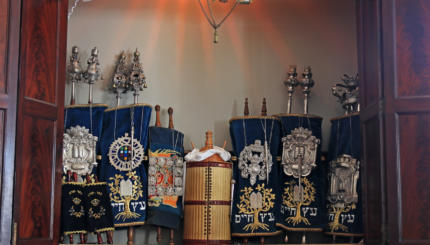In reading the story of the Akedah (the binding of Isaac) most people focus on the role of Abraham. In this fictional story, the author looks at the lasting affect this trial had on the intended victim of the sacrifice, Isaac. Reprinted with the author’s permission from A Big Jewish Book: Poems and Other Visions of the Jews from Tribal Times to Present, edited by Jerome Rotheberg with Harris Lenowitz and Charles Doria (Anchor Press).
It is said that as he grew older Isaac put the journey to Mount Moriah out of his mind. Even to Rebecca, his wife, he would not speak of what had happened. So circumspect did he become that by the time of his marriage at the age of forty no one could remember the last time he had been heard to speak on the subject. So it seems likely that during the period in which his wife was expecting a child the old memory came to his mind even less often, for Rebecca had grown ripe with her waiting, which was already much longer than the old wives had estimated.
On one such night, while he and Rebecca were sleeping side by side, Isaac dreamed for the first time of the sacrifice that had taken place almost thirty years before. But this dream was even more real than the actual incident, for then his confusion had saved him from his fear, and now all the terror he had not noticed was with him as a faceless man chained him to a great rock and held a knife against his neck. He felt the blade poised to press down when the sun emerging from behind a cloud blinded them both, and at the same time they heard the frantic honking of a goose whose grey and white feathers had become entangled in the thorns of a nearby bush. It was then that the fierce and silent man, whom Isaac now saw was his father, put down the blade and pulled the bird free from the thorns and berries, and as he brought it back Isaac saw how it struggled in his hands. Then, when the goose was pressed firmly to the rock, Isaac watched as his father pulled back the white throat and drew the blade. He saw especially how white was the neck and how cleanly the blade cut through. At last Abraham put down the blade and unbound his son and they embraced. It was then that Isaac opened his eyes, felt the arms of his wife as she tried to wake him, and heard her whispering that the child was about to be born.
When Isaac understood, he sat up in bed and hurried from the room to wake the midwife who had been living with them for almost three weeks. Two hours later Rebecca gave birth first to one son and then to another, the first who was hairy, his skin red, the second who came forth with his hand on his brother’s heel. Isaac found himself fascinated as he watched the midwife wash the infants in warm water. The first son, whom they came tocall Esau, was bornwith an umbilical cord that was dark purple, the color of blood. But his second son, whose name became Jacob, had a cord that was soft and white as pure wax. It was this perfectly woven rope that Isaac found most intriguing, for reasons that he could not comprehend. And he sensed a strange terror as he unsheathed a knife and drew the blade tosever this last link between what was and what will be. Forit was then the dream of that night came back tohim, and he saw in the same instant how the hands of his father had held down the goose, and how the sharp blade had cut across its neck, soft and white, like the severed cord he held in his own hands.
With your help, My Jewish Learning can provide endless opportunities for learning, connection and discovery.


